
The Safe Place and Rape Crisis Center Helps Women and Men Flee Abusive Relationships
*Some names have been changed or omitted in order to protect the confidentiality of those who spoke with Sarasota Magazine for this story.
One evening last fall, at around 9 p.m., Cristina pulled up in front of the Sarasota house she had once shared with her husband, Derek, and sat behind the wheel, staring at the front door. For the past few days, she had been living in a shelter run by Sarasota’s Safe Place and Rape Crisis Center, known as SPARCC. Derek had been arrested twice for domestic battery, and Cristina’s daughters were removed from their house by the Florida Department of Children and Families. As she sat outside in her car, Cristina, a petite Peruvian-American in her mid-30s, blamed herself for the “nightmare” her life had become.
Cristina and Derek had been married for nearly a decade. At first, he was charming, Cristina says, and she thought he would make a “tremendous father” for her older daughter, who was from a previous relationship. (The other daughter was born in 2012.) But over the years, he became controlling and abusive. He shoved Cristina and her children to the floor, grabbed their hair and pushed them into walls, according to Cristina. She says he also pressured her to have an abortion, belittled her, prevented her from working, dictated whom she could be friends with and forced her to dress conservatively.
Cristina felt paralyzed. Her first marriage had ended in divorce. Raised as a Catholic, she dreaded admitting to another failed relationship and fretted over the judgment of her parents. She worried, too, that, as an immigrant from South America, law enforcement would be more inclined to believe Derek, a white American, rather than her. Above all, she worried that leaving meant she would lose custody of her youngest child, since Derek was the father. “I didn’t know where to go or who to talk to,” Cristina says. “I was trapped.”
Cristina’s tale has become a familiar one in the last year as sexual and domestic violence and the use of intimidation by powerful men have dominated the news. Harvey Weinstein, Bill Cosby, Roger Ailes, Matt Lauer and a galaxy of other celebrities have been exposed for their decades of sexual exploitation. Even the president of the United States has bragged about assaulting women. As women—and men—have recognized themselves in the victims, the #MeToo movement and its fury have swept across the country and the world, shocking many people about how widespread these experiences are.
This is all old news to SPARCC, a Sarasota organization that for almost 40 years has been fighting to remove women and men from dangerous situations. Today, SPARCC employs 43 individuals (41 of them women), operates a 24-hour shelter that can house up to 33 people and collects annual revenues that top $3.2 million.
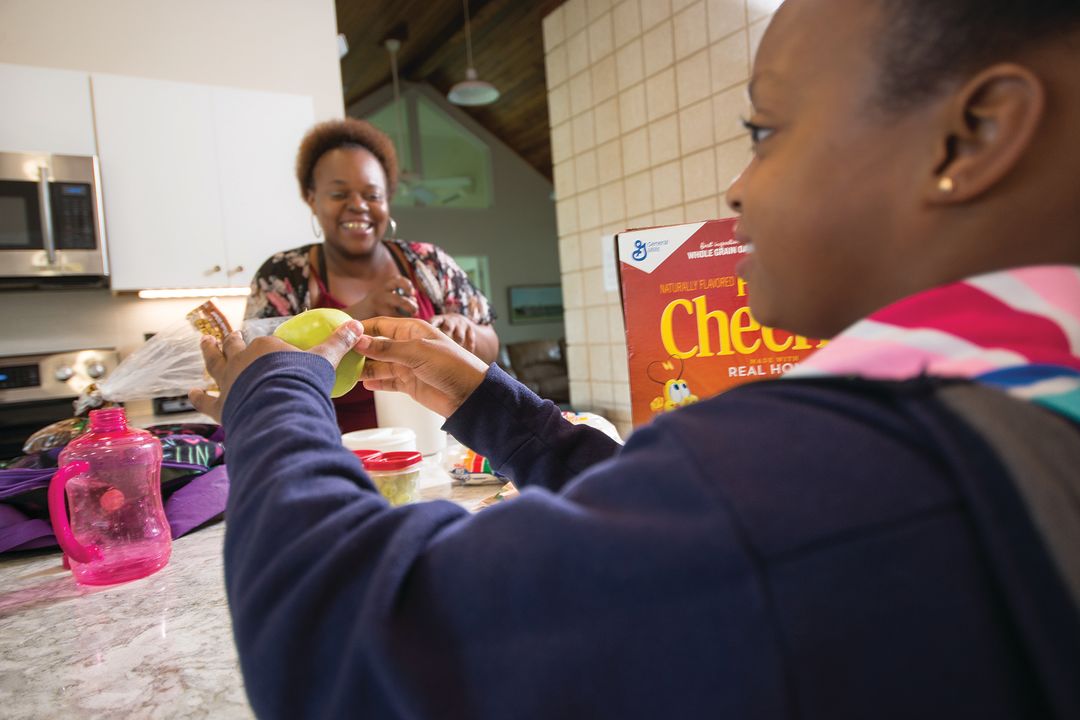
The SPARCC shelter houses individuals, families and even pets.
Image: Barbara Banks
Demand for SPARCC’s services continues even though Florida’s rates of sexual assault and domestic violence have declined over the past two decades. The number of domestic violence crimes in the state (a list that includes homicide, forcible sex offenses, assault, stalking and more) dropped from 124,629 in 2000 to 106,979 last year. Over the past 23 years, the rate of forcible sex offenses in Sarasota County has dropped by 66.3 percent. Reported instances of domestic violence are down by 44.8 percent.
Still, in 2017, law enforcement reported more than 1,400 domestic violence offenses in Sarasota County alone. Nearby DeSoto County, which is also served by SPARCC, was ranked last year among the worst 10 counties in Florida for its high rate of domestic violence. Roughly 10 percent of adults who seek services from SPARCC are male, up from 8 percent just two years ago.
In its most recent fiscal year, SPARCC received 2,591 calls to its main crisis hotline, housed 575 individuals in its shelter and responded to hospital calls to assist victims of sexual assault 89 times. Those numbers have fluctuated over the past five years, but overall, they’re up.
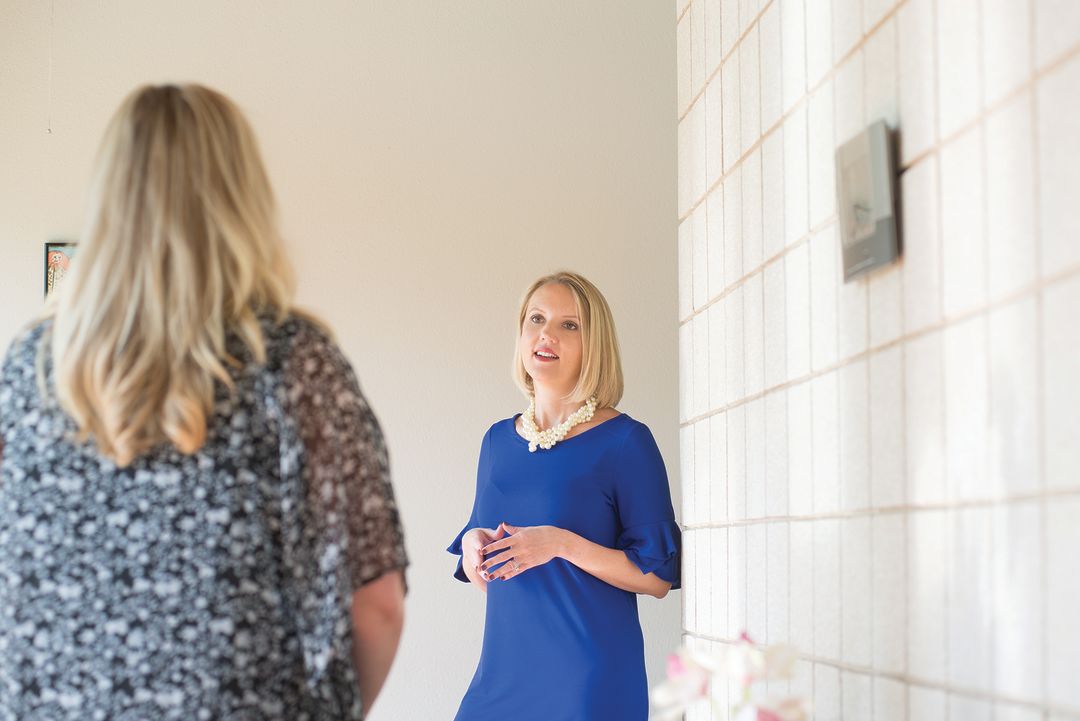
Jessica Hays, SPARCC’s executive director, has grown the number of services the nonprofit offers.
Image: Barbara Banks
SPARCC’s executive director Jessica Hays says there’s no single reason that explains the disparity between crime rates declining and calls to SPARCC increasing. Overall, instances of sexual assault and domestic violence are “vastly underreported,” she says. It’s possible, she says, that victims are calling SPARCC and getting help before law enforcement gets involved.
“Hopefully our services are going up because more people are aware of them, and not because there are more victims,” says Hays, who adds that Sarasota’s affluent and beautiful environment makes it seem an unlikely setting for this kind of violence. “[Sexual violence] is not just in other places," she says. "It’s not just in other neighborhoods. It’s my friends’ families. It’s people we know."
For Cristina, things came to a head early one morning last year when Derek was arrested for punching Cristina in the couple’s home. Cristina’s older daughter ran to a neighbor’s house to call the police. Derek was arrested. Because children were involved, the Department of Children and Families arrived the next day and launched an investigation. The agency at first just removed Cristina’s older daughter, citing Cristina’s “failure to protect” her children from abuse and placing the daughter with Cristina’s parents. The department offered Cristina a free place to stay with both of her daughters, but Cristina turned it down. She still thought she could make her marriage work.
“You still have that little hope that something will change, something will click, and you will have that perfect family that you wanted,” she says. “He drove me to the state attorney’s office to drop the charges and promised me it was going to be OK. Well, it got worse, way worse.”
After interviewing Cristina’s younger daughter as part of its investigation, the Department of Children and Families eventually removed her from the home to protect her as well. Cristina had gotten a new job cleaning commercial properties. She was at work when she heard that the department was taking away her younger daughter. When she rushed home, her daughter was gone. Cristina was hysterical. It took her hours to learn that her daughter had been placed safely with her parents. “There are no words to describe that,” she says.
Then, two months after his first arrest, Derek punched Cristina in the face again. After he left the house, Cristina closed the door, decided she had had enough, picked up her phone and dialed SPARCC’s emergency hotline: (941) 365-1976.
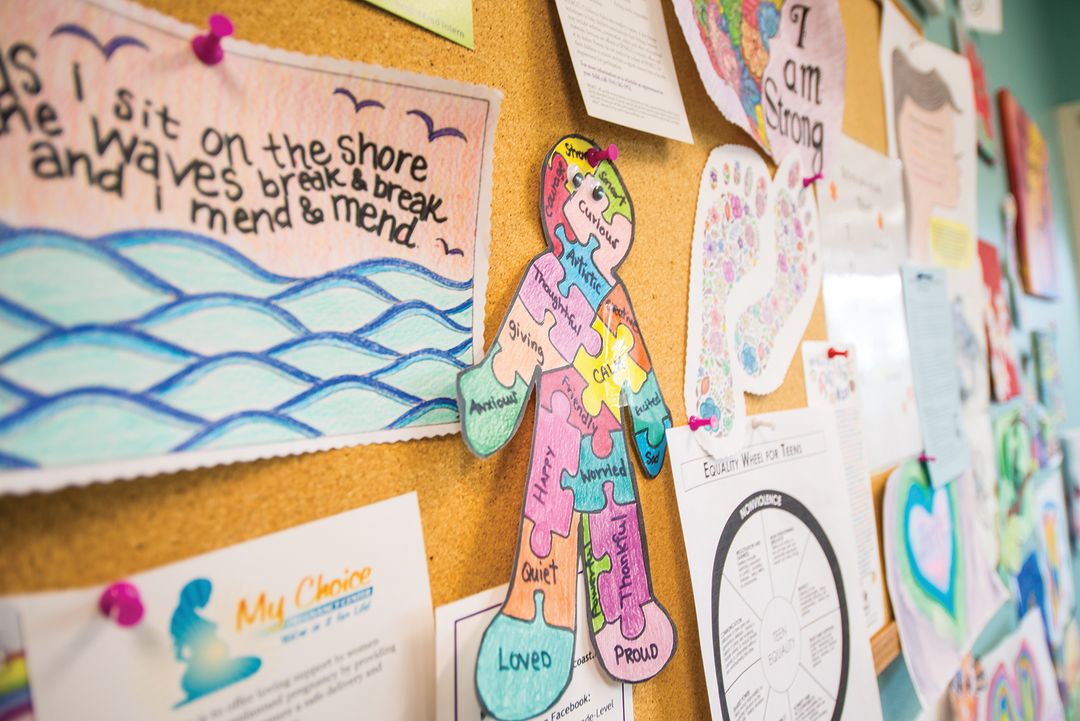
Image: Barbara Banks
Forty years ago, SPARCC was only a phone number.
Outraged by the rape of a young woman on Siesta Key and the lack of resources and support for her and other victims, 13 Sarasota women launched the area’s first around-the-clock hotline for rape victims in the mid-1970s. They installed the phone line in a woman’s home and paid the bill with revenue another woman earned by knitting and selling hats and gloves. When a call came in, volunteers drove to meet the victims, even in the dead of night, at great personal risk, and helped however they could. One woman offered her own two-bedroom home as a makeshift shelter for women in need.
While the original purpose was to help victims of sexual assault, the all-volunteer force that manned the hotline quickly began receiving a flood of calls from women threatened by domestic violence. Jean Gay, SPARCC’s first executive director, says police officers then didn’t take sexual and domestic violence seriously. “The police at that time thought a woman was raped because she was someplace she shouldn’t have been, or she was in a dress that was too short, and a spouse abuse victim asked for it,” says Gay, now 89. “If they didn’t like it, they would leave their husband. They didn’t take into consideration the woman had no money on which to live and there were usually children involved.”
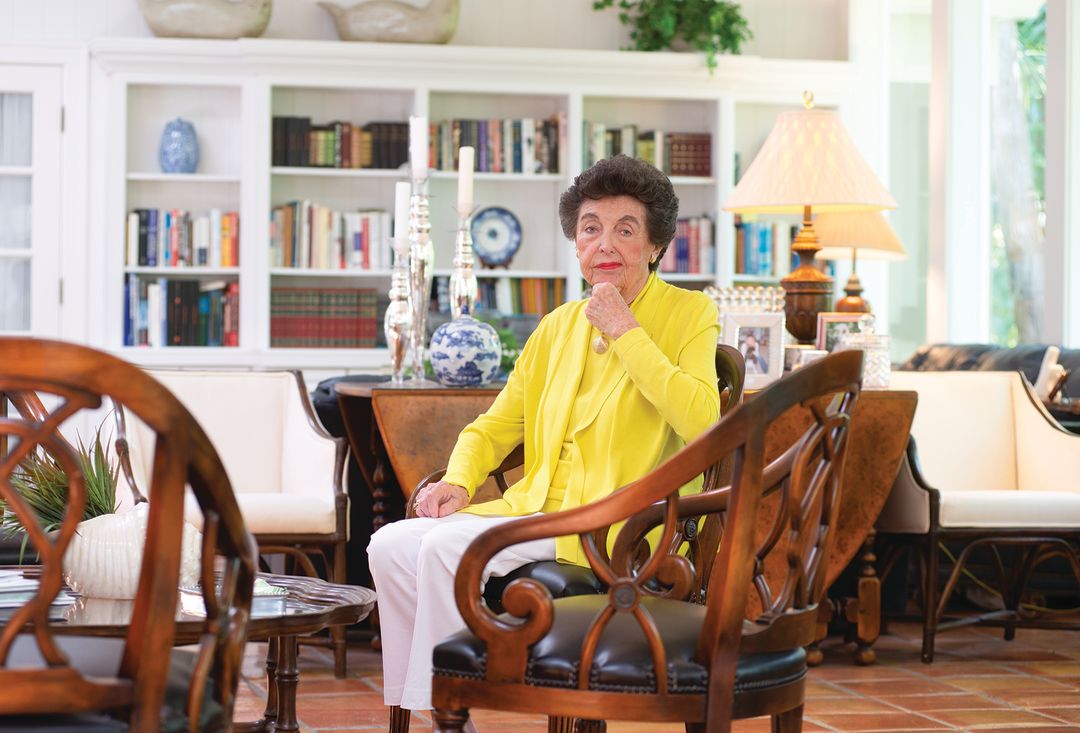
Jean Gay led SPARCC for two decades.
Image: Barbara Banks
As SPARCC struggled to find funding for office space, a dedicated shelter and professional staffers, it also fought to change perceptions about sexual and domestic violence, both with law enforcement and in the broader Sarasota community. Gay created a women’s auxiliary that held cocktail parties where they’d raise money and spread the word. She also enlisted the help of her husband, Tuck Gay, a banker at Northern Trust, to reel in well-heeled donors.
While empowering women might have struck conservative Sarasota society as the province of “bra-burning liberals,” in Gay’s phrase, she and her peers made it a cause célèbre among the city’s elite. Well-known philanthropists such as Mary Ann Robinson and Margaret Wise publicly added their names to the cause and lent support. The 1995 O.J. Simpson murder trial and its details of domestic violence also began to change perceptions. By the time Gay retired in 1999, police agencies had begun to recognize the common patterns of abuse and take preventive action.
Today, SPARCC has in-house attorneys to assist survivors and has increased therapy services and grown its educational programs for youth starting in grade four. SPARCC’s shelter (the location of which is never revealed publicly) is frequently full; Hays says the nonprofit hopes to enlarge the facility in the near future.
As SPARCC employees help survivors rebuild their lives, they rely on a simple act: listening. “When you show someone kindness when they’re coming out of a situation where it’s nonexistent, just a small expression of kindness goes far,” says Christian Hind, who is a lead domestic violence victim advocate at SPARCC. “Sometimes we’re the first people to take them seriously.”
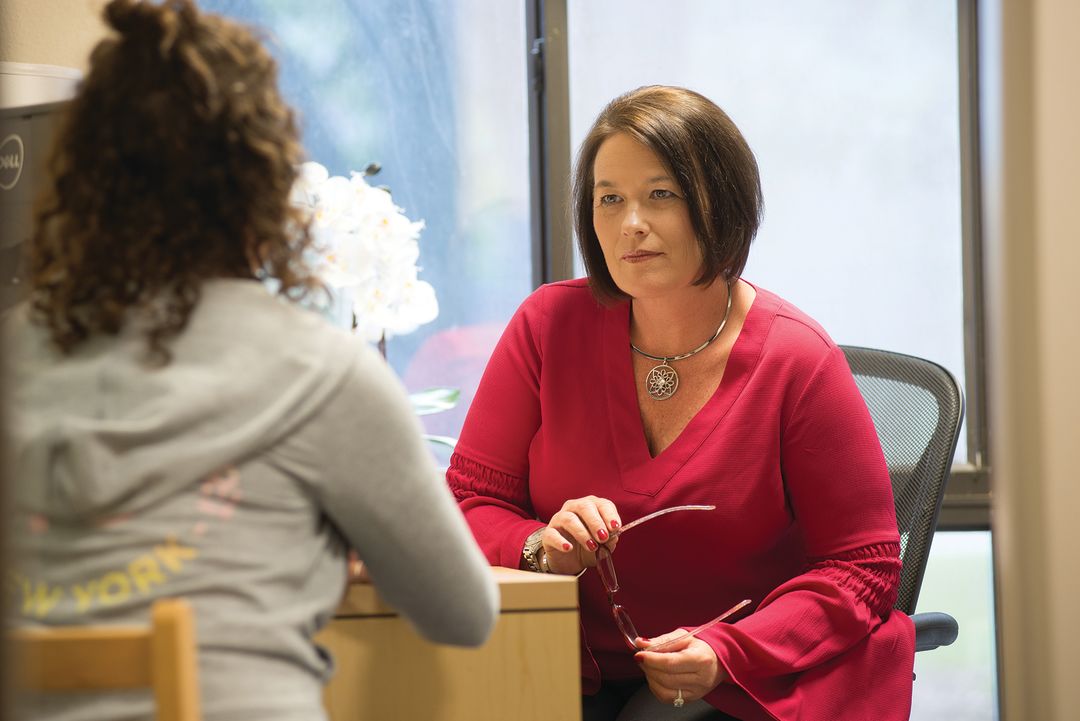
SPARCC domestic violence victim advocate Christian Hind.
Image: Barbara Banks
Victims choose not to report sexual assault for any number of reasons, Hind says. They’re often scared, fearful of becoming entangled in the criminal justice system and daunted by the prospect of spending months in court. Many, like Cristina, also fear social judgment.
Even after survivors have made the difficult decision to leave an abusive relationship, practical difficulties abound. Drew Grissell works in the SPARCC shelter, helping women and men figure out their next steps. “The No. 1 thing [survivors ask] is, ‘Where am I going to live?’” she says. Finding affordable housing is a thorny task for anyone in Sarasota—thornier still for those in the shelter. Roughly half of them don’t have bank accounts and are forced to rely on predatory payday lending companies. As a result, they often have little savings and poor credit. Plus, apartment owners often don’t want to rent to survivors, because they fear that abusers might lurk near their complexes or even move back in with survivors.
Finding work is difficult, too. Many employers refuse to be flexible with survivors who are struggling with trauma and need to keep up with court dates and counseling sessions. “We had one young lady recently who was let go from a job due to the domestic violence situation and she hasn’t been able to get another one because she was fired,” says Grissell. Grissell encourages survivors who feel comfortable talking about their situation with their bosses to do so, but not every employer understands, or cares.
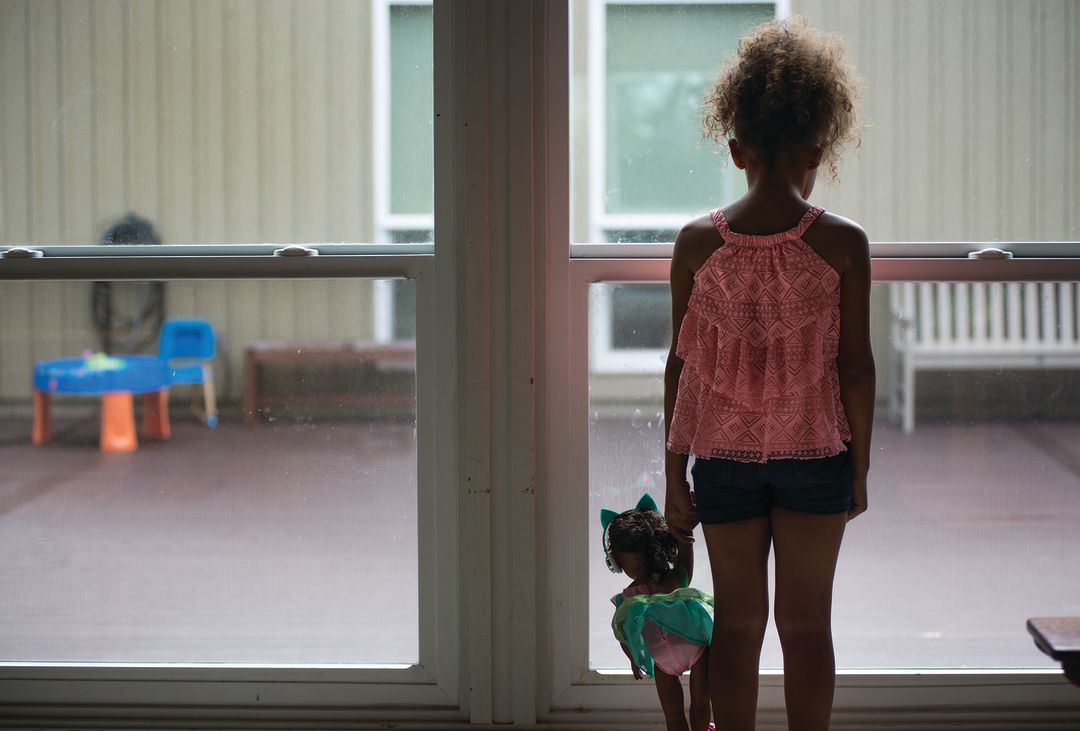
The SPARCC shelter houses up to 33 survivors at a time and is often full.
Image: Barbara Banks
All of these problems tumbled through Cristina’s head as she sat in her car outside her old house. She was tempted to walk back inside and try again. She felt desperate, sad and lonely and—inconceivably—worried about how her husband was holding up without her to care for him. He had promised again that things would change. “It took me a little bit,” she says. “But I turned my car around and went back to the shelter.”
At the shelter, she had a safe place to rest her head and access to counselors, but it was still a “horrible situation,” Cristina says. “You see other women with children there and other women, like me, whose kids were taken away, and you get into conversations. You cry.” It was therapeutic, but also lonesome. “Most nights, I was awake, not sleeping,” Cristina says. “I was trying to figure out what I did wrong to deserve this.”
Throughout her ordeal, Cristina leaned on Kelly Schweers, a senior domestic violence child welfare advocate with SPARCC. Schweers helps survivors like Cristina navigate Department of Children and Families investigations. She and other advocates also come to court dates, answer text messages and even help cover mundane living expenses by supplying gas cards and coupons for haircuts. Cristina says Schweers gave her hope that she could find a way out, but it took time to learn that she could trust her. “She has always been there for me,” Cristina says.
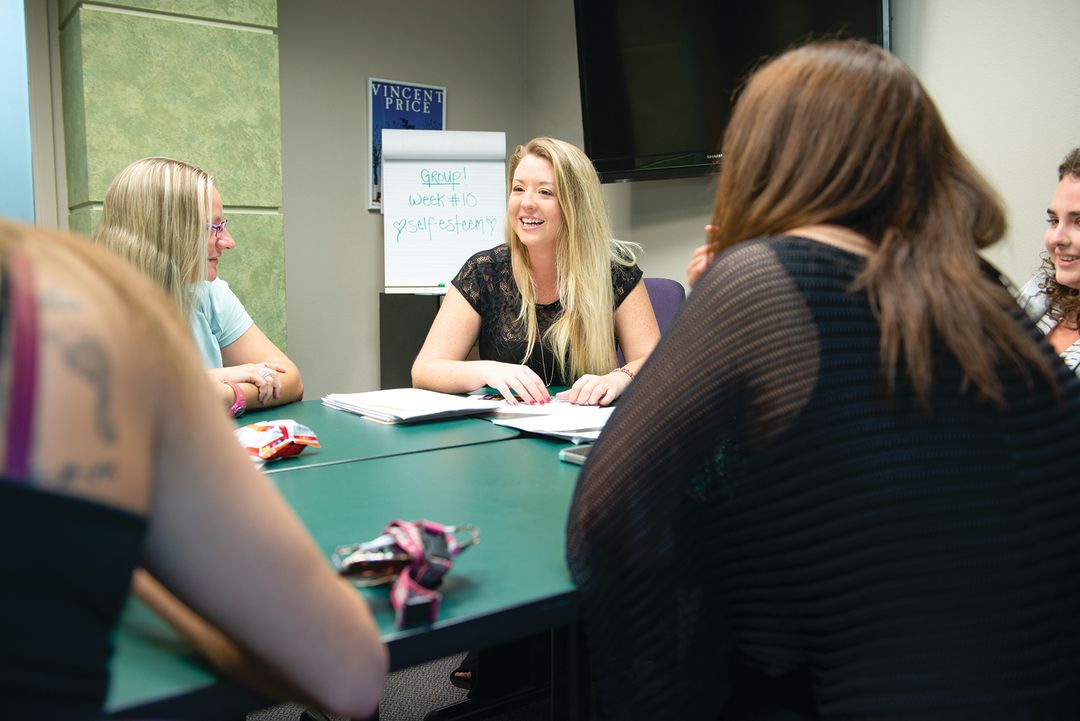
SPARCC’s Kelly Schweers leads a weekly support group for survivors of domestic violence.
Image: Barbara Banks
Cristina knew that if she wanted her kids back, she had to demonstrate to the Department of Children and Families that she could care for them in a safe environment. The department laid out a case plan that required her to find a new home and stable employment and attend therapy. Cristina was determined to make it out of the shelter as quickly as possible.
It takes many survivors as long as a year to be reunited with their children. It took Cristina, whom Schweers calls “the ultimate survivor,” two and a half months. Last December, Cristina moved out of the shelter and found a new apartment and a new job managing a cleaning crew. She was reunited with her children in January. “There’s no more yelling. There’s no more cussing out. There’s no more aggression,” she says.
While raising her kids and holding down a job, Cristina is spending her days in and out of court, attending therapy sessions (her children are in therapy, too) and dealing with the Department of Children and Families. But she no longer feels trapped, and her bond with her children has deepened. “We have become very attached to each other in every single way,” she says.
The struggles with her husband aren’t over. He has harassed her on Facebook, come around her apartment and called her on her cell phone. In June, he was arrested for violating a no-contact order and was sentenced to house arrest and probation. Cristina is resolute. “He has woken up a lion who’s ready to protect her cubs,” Cristina says. “Nobody’s going to take them away again.”
For years, she believed her husband’s insults. “When you’re told the same thing over and over again, you start believing that,” she says. “Is it true if I’m gone my kids will be better off? Am I truly scum, this awful person he’s telling me I am? Am I truly a horrible mother?”
While her memories are painful, Cristina no longer blames only herself for the nightmare of her life. “I don’t have to hide anymore,” she says. “Do you have any idea how many women are out there like me? Women who go back because they think they cannot make it on their own? It can be done. I did it.”